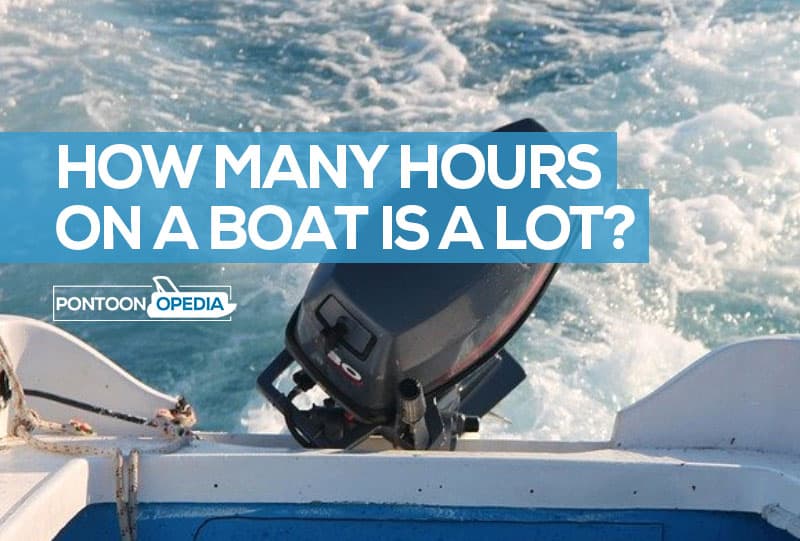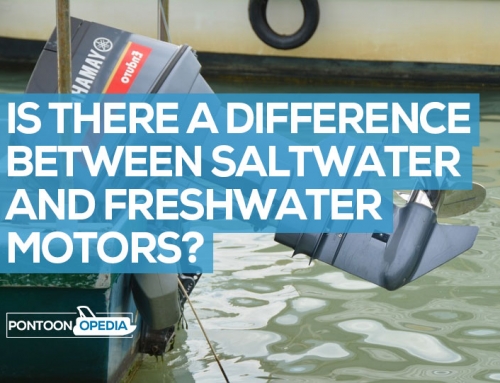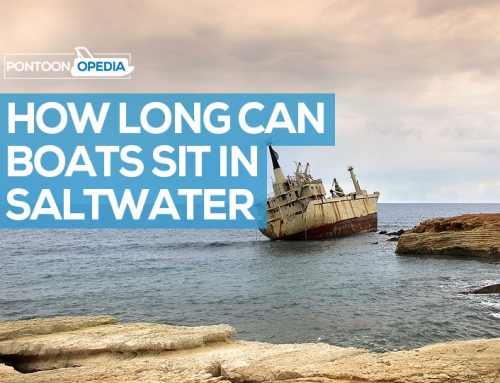You’ve been looking for a boat and you found one that meets your needs and your budget. The engine has over 1000 hours on it. How do you know if this is a good deal or a bad deal? In this guide I will explain how many hours on a boat is too many, plus lower down what the average hours are, and how find the hours on a boat motor.
How many hours on a boat engine is a lot? What you consider to be too many hours on a boat motor will depend, with some people say boat engines with over 1,000 hours will start to give you trouble. Most experts agree that a gas boat engine with over 1,500 hours is a lot.
A boat engine goes through a lot. Most people use their boats infrequently throughout the year. The engine may have a lot of years on it, but not too many hours – this can be a great deal if you can find one!
Although the number of hours logged on an engine can affect its performance and lifespan, there are other things to consider as well.
So, before you turn away what could be a good purchase, let’s look a little deeper at what factors determine how many hours is a lot on a boat engine.
Table of Contents
What affects a motor’s lifespan?
While it may be easy to claim that the lifespan of an outboard engine is judged purely by the number of hours it has logged, that would not be accurate. Just as a used car may have high mileage and still be in great condition, a well-maintained quality boat engine can be reliable for well over 1,500 hours.
The aspects that will also impact a boat engine’s performance include:
- The age of the engine
- The type of engine: Gas or diesel?
- The type of engine: Two-stroke or four-stroke?
- The model of the engine
- How the boat was used
- Maintenance
1. The age of the engine
Most people don’t take their boat out every day during the year. Instead, most boat owners log in 50-75 hours a season. That being said, it is good to note that boat owners that live in places with more beaches and water, typically use their boats more and log more hours during a season.
If you are looking at a used boat engine from an owner in Florida and the hours are low, that might be suspicious. However, if a boat engine is well maintained and the oil is changed about every 50 to 75 hours, or at the end of every season, the age doesn’t necessarily figure into the equation.
2. The type of engine: Gas or diesel?
The average gas boat engine when properly maintained will usually make it to 1,500 hours without any major repairs. A well-maintained diesel boat engine can make it to 3,000 hours if it is used for long, consistent trips.
A diesel boat engine used for short jaunts, as most recreational boats in the U.S. are, will average about 1100 to 1500 hours.
3. The type of engine: Two-stroke or four-stroke
There has been a debate among boat owners about which is better: two-stroke or four-stroke engines. Each has its advantages and drawbacks.
Two-stroke engines:
A two-stroke engine has one chamber with an input port for the fuel mixture and an output port for the exhaust. Older models use a carburetor to adjust the fuel mix, but newer models meet EPA standards using DFI or EFI.
Pros:
- Lighter Weight
- New models have Direct Fuel Injection (DFI) or Electronic Fuel Injection (EFI) resulting in fewer pollutants and better performance.
- Cheaper
- Accelerates faster
Cons:
- Older models have a carburetor and are subject to EPA regulations and not environmentally friendly
- Less fuel-efficient than 4-stroke engines
Four-stroke engines
A four-stroke engine has input valves and exhaust valves. It works similar to a car engine.
Pros:
- Quieter
- More Torque
- Less Vibration
Cons:
- Heavier
- Slower to accelerate
4. The model of the engine
Some boat engines are designed better than others, meaning that the amount of hours on certain brand boat engines won’t be considered high compared to lesser brands. While opinions vary, the top three manufacturers are usually listed as:
- Yamaha
- Suzuki
- Evinrude
While Yamaha and Suzuki focus on four-stroke outboard boat engines, Evinrude continues to make improvements on their two-stroke engines.
5. How the boat was used
Most people buy a boat for recreational purposes. They want to relax and have some playtime. If you consider some of the basic activities, we use our boats for, you notice they each require a lot of stopping, starting, and idling.
- Waterskiing
- Fishing
- Scuba diving
- Exploring
These things are fun for you, but not good for the life expectancy of your boat engine. Driving at low speeds and stopping and starting, add wear and tear on your boat engine.
A boat engine performs best on long, consistent treks. The more wear and tear you put on your boat, the fewer hours you will get out of it. So, even if a boat doesn’t have many hours on it, that doesn’t mean the engine is going to be in great shape.
You also want to look at what type of load you are carrying on your boat. Heavy loads on a boat engine designed for less weight, strain the engine which adds more stress on the boat engine.
The more stress on the boat engine, the fewer hours you will have.
6. Maintenance
Of all the items that can impact the lifespan of your boat engine, how well it has been maintained is the most important. If you want your boat engine to last a long time, you need to take the time to care for it.
Knowing what to look for and how to correct issues will go a long way to making your boat engine last, regardless of how many hours it has logged.
Saltwater and salty Air
Salt is hard on metal. Saltwater can corrode metal up to ten times faster than freshwater. Leaving your boat in the saltwater or exposed to the salty air can cause you trouble and big repair bills if you are not careful.
Salt will strip minerals from the metal and leave it vulnerable to corrosion and rust. Flush your engine with fresh water frequently and soon after you take it out of the water. Inspect regularly for signs of corrosion.
Handy Hint: Saltwater can have a devastating effect on certain motors, which is why you can buy engines designed for different water environments.
Smoke signals
The color of the smoke emanating from your boat engine can be a good indicator of issues that need attention. Knowing what is causing the smoke and how to fix any problems will go a long way to knowing how many hours on a boat engine is a lot.
White Smoke
White smoke can be normal when you start a boat engine cold. White smoke can also indicate you are using poor quality or dirty fuel. Also, if water has gotten into your fuels you may see white smoke.
Blue Smoke
A little cloud of blue smoke when you start your engine is not always indicative of a bigger problem. When you do see a big cloud for a longer time, you may have a bigger issue.
Idling the engine frequently will cause it to misfire. If you start to see blue smoke with the misfire, head to the repair shop.
Blue smoke can also indicate an improper fuel to oil ratio and may be a symptom of filling the oil past the proper lever, causing it to leak into the crankcase. Your marine engine mechanic can do a thorough analysis.
Black Smoke
Black smoke is not a good thing and can mean you have a big repair bill in your future. Black smoke could mean you have clogged hoses or air filter. It is also a symptom of an oversized or damaged propeller. If you start to see black smoke coming from your boat engine, turn off the engine and call the mechanic.
Oil changes
Most manufacturers recommend you change the oil on your boat engine at least every 100 hours. Also recommended is that you change your oil at the end of every season. This generally means you will need to change the oil at least once a year, in the fall, before you winterize your boat for the year.
- Always change the oil when the engine is warm
- At least every 100 hours
- End of every season
- At least once a year
Keeping her going
Boat engines are not designed to sit still. The best way to get the most hours out of your boat engine is to keep her going. An engine performs best on long sprints with the engine fully opened and less time idling with frequent stops.
Also, boat engines don’t like waiting between uses. The more consistently you can take out your boat without a lot of downtime, the better it is for your boat engine.
How to find hours on a boat motor and the history?
If you are buying a used boat engine, you want to know its history and will want to know how to find the hours on the boat motor. Let’s look at where to start your hunt.
1. Installed hour meter
Most newer model boat engines, those manufactured since the 90s, have this meter installed near the engine or around the steering console. Make sure the meter calculates the hours the engine has been running, not just when the battery was turned on.
If your boat does not have an hour meter installed, talk to your mechanic about getting one in place.
If there is one installed, this will let you find out how many hours is on the boat, and make a call on whether you think it’s too many or a lot.
2. Service records
If the boat you are looking at is older or does not have a meter installed, ask for the service records. Just like buying a used car, the current owner should be able to easily provide these.
3. Get a mechanic to check it over
If you are still not sure how many hours your boat engine has, take it to a mechanic. They have tools and methods to check how many hours your boat engine has logged.
Related questions
Now you know how many hours on a boat engine is a lot, I wanted to go into a little more depth with some very related questions, with my answers.
What is the average hours on a boat per year?
Of course, this is quite a tricky one to answer given the wide range of boats on the water being used for different purposes. However, if we think just about recreational boats used for fishing and fun, we can come up with a few estimates on the average hours on a boat per year.
I canvassed 13 buddies of mine, and after collating their figures, the average hours on a boat per year came in at just under 100 hours.
Is 700 hours on a boat a lot?
If you are thinking about buying a boat with 700 hours on the engine, but it’s been kept in great shape and not hammered with regular maintenance, then actually 700 hours on a boat might not be a lot. It’s completely down to the brand and upkeep of the motor.
Is 200 hours on a boat a lot?
In most cases, 200 hours on a boat motor is not a lot, but as with previous answers, the more important aspect is the condition of the engine.
The last word…
I am a huge pontoon boat fan and have written lots of articles about boat motors you might find interesting. Here’s a selection of the latest for you to browse through.






